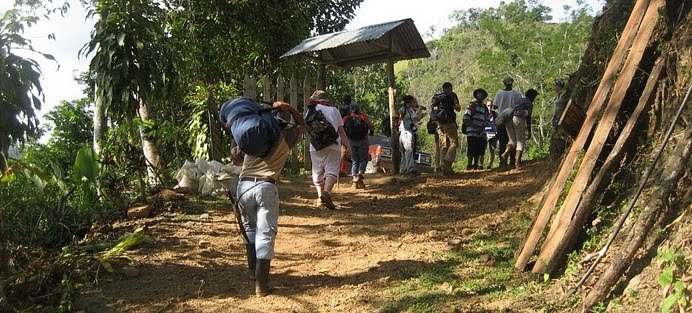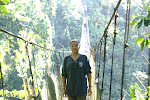Friday, April 9, 2010
Moving Into the Heart of Costa Rica
Ryan Oliver, Social Studies Teacher
During our time in San Jose we've clearly experienced vast differences in culture, values and day to day routines of life. Students are facing challenges related to food, friendships, and schedules that would wear down even the most energetic teen. However, we remain immersed in the familiar rhythms, stimuli, and anxieties of modern urban life. With the exception of Thursday's visit to Poas and a brief walk through a dwarf forest, mostly ignored in the excitement of having more time with our Costa Rican friends, nature has been a pretty ornament along concrete streets and a flavorful fruit juice served at breakfast.
That is about to change...
Friday morning we leave our hotel and our electronics behind to wind our way up over the mountains surrounding San Jose and the city, arriving four hours later in the coastal city of Puerto Viejo. From their we will board canoes and be transported up the river to Bribri territory in Talamanca, one of the last remaining indigenous communities in this country of 4 million that often ignores and downplays it's native roots.
This will be much more than a physical journey as it entails removing ourselves from the hectic but comfortable pace of city life with its time schedules, appointments, and rapid movements from one stimulating activity to another. In Jacob Needleman's terms, we will be leaving the world in which time is the master of men and women to enter a world of slow natural rhythms of rain, birth, decay, death, and rebirth. In listening to this world and slowing down our minds and bodies to meet it's pace, we hope all will have a better chance to experience the "conscious time," that can emerge when we move slow enough to experience both the inner and outer sounds usually drowned out under the din of city life.
Joseph Conrad and other western colonial writers were simply wrong when they described these pockets of "uncivilized" community as "darkness." They may be dark in a literal sense as a result of minimal electricity and technological advancements that fill up the nights with sound and light, and we may not agree with all their traditions and values, but they are better described in the richness of color they hold for those that look and listen closely and with more curiosity. As we travel tomorrow we will be entering the Heart of greenness and brownness, of community and independence in the face of dominating brutal forces, and the Heart of life lived in relationship with the natural world rather than at war against it.
As a logical result, there will be no internet access and no blog postings until we re-emerge Tuesday afternoon. May we continue to face challenges head on, supporting one another as the small travelling family we have become.
During our time in San Jose we've clearly experienced vast differences in culture, values and day to day routines of life. Students are facing challenges related to food, friendships, and schedules that would wear down even the most energetic teen. However, we remain immersed in the familiar rhythms, stimuli, and anxieties of modern urban life. With the exception of Thursday's visit to Poas and a brief walk through a dwarf forest, mostly ignored in the excitement of having more time with our Costa Rican friends, nature has been a pretty ornament along concrete streets and a flavorful fruit juice served at breakfast.
That is about to change...
Friday morning we leave our hotel and our electronics behind to wind our way up over the mountains surrounding San Jose and the city, arriving four hours later in the coastal city of Puerto Viejo. From their we will board canoes and be transported up the river to Bribri territory in Talamanca, one of the last remaining indigenous communities in this country of 4 million that often ignores and downplays it's native roots.
This will be much more than a physical journey as it entails removing ourselves from the hectic but comfortable pace of city life with its time schedules, appointments, and rapid movements from one stimulating activity to another. In Jacob Needleman's terms, we will be leaving the world in which time is the master of men and women to enter a world of slow natural rhythms of rain, birth, decay, death, and rebirth. In listening to this world and slowing down our minds and bodies to meet it's pace, we hope all will have a better chance to experience the "conscious time," that can emerge when we move slow enough to experience both the inner and outer sounds usually drowned out under the din of city life.
Joseph Conrad and other western colonial writers were simply wrong when they described these pockets of "uncivilized" community as "darkness." They may be dark in a literal sense as a result of minimal electricity and technological advancements that fill up the nights with sound and light, and we may not agree with all their traditions and values, but they are better described in the richness of color they hold for those that look and listen closely and with more curiosity. As we travel tomorrow we will be entering the Heart of greenness and brownness, of community and independence in the face of dominating brutal forces, and the Heart of life lived in relationship with the natural world rather than at war against it.
As a logical result, there will be no internet access and no blog postings until we re-emerge Tuesday afternoon. May we continue to face challenges head on, supporting one another as the small travelling family we have become.
Subscribe to:
Post Comments (Atom)










"The horror! The horror!"
ReplyDeleteThank you for your commentary Mr. Zinga.
ReplyDeleteI would like to just say I really appreciate the experience that you guys allow the students to gain. I am just at a loss of words....I am just a proud parent!!! The photos are beautiful!! As a child I wish that there was a school like CCHS...There is none like it!!! :)
ReplyDeletecan't wait to hear about the canoe transport!
ReplyDelete